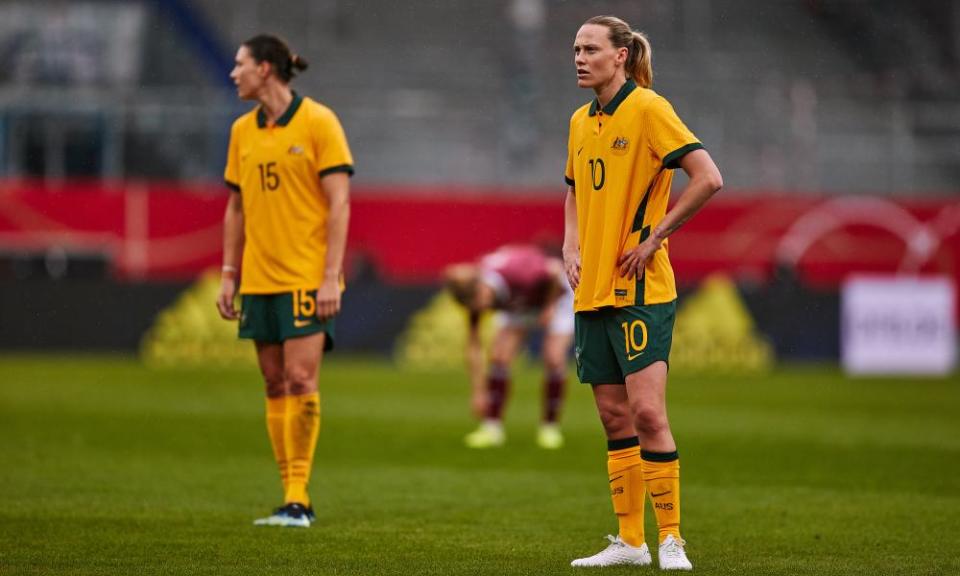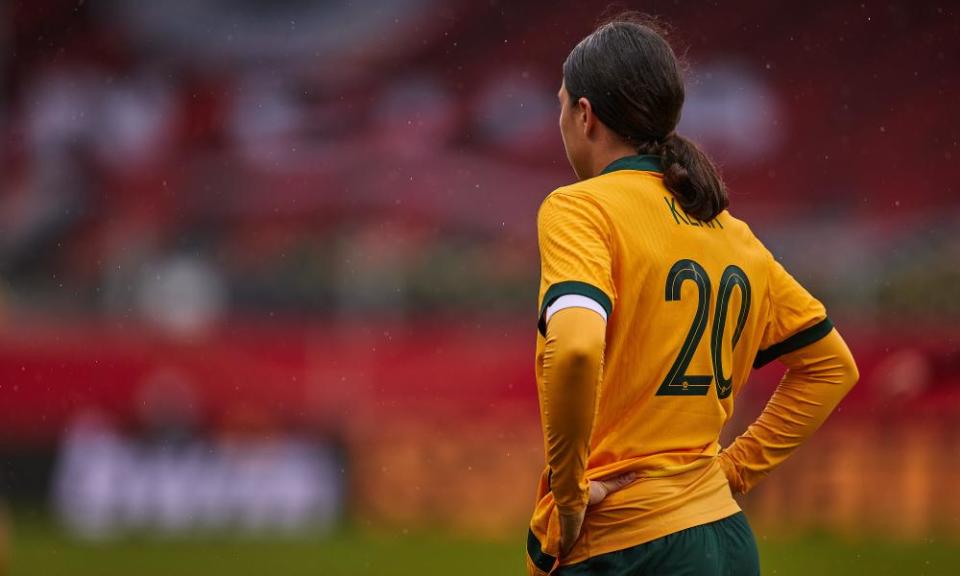Adaptability proves its worth despite Matildas’ thrashing by Germany

It is not often Sam Kerr’s number glows red on the substitute board during an international game – particularly not one in which the Matildas are losing.
But in the 75th minute of Australia’s friendly against Germany, with her side 4-0 down, Kerr – widely considered one of the best and most in-form strikers in the game with 23 goals in her last 28 games – tossed her captain’s armband to teammate Alanna Kennedy and shuffled, dissatisfied, off the field.
Related: Germany rout Matildas 5-2 to give coach Tony Gustavsson ‘reality check’ – as it happened
Six minutes later, Australia scored their first goal of the match. The goalscorer, Emily Gielnik, had played peripherally up until that point – relegated to the right wing so that Kerr and fellow FA Women’s Super League player, Caitlin Foord, could be given the freedom to rotate and rekindle their decade-long chemistry as Australia’s main strike partnership.
There were sputters and sparks of it – a one-two here, a pass in behind there – but both players were, by virtue of their sensational club form, marked women. And marked they were; in Kerr’s case, practically out of the entire game. She touched the ball just 24 times and did not register a single shot.
Once Kerr was off the field, though, Australia looked more dangerous. Gielnik was given permission to shuffle centrally into the position her skipper vacated; the same position that saw the former Brisbane Roar striker recently crowned the 2020-21 W-League Golden Boot winner. Just a few touches later, Gielnik was picking the ball out of the back of Germany’s net.
She would do it again 10 minutes afterwards, having planted her feet firmly on the line of the six-yard box to send an Emma Checker cross into the corner of the net, bringing the game’s final score to 5-2.

If there is a word to describe this series of friendlies for the Matildas as they hastily prepare for the start of the Tokyo Olympics in July, it would be the same word that head coach Tony Gustavsson used repeatedly when he formally began his role during lockdown in January: adaptability.
In his first press conference, Gustavsson paraphrased Charles Darwin: “It’s not the strongest that survives, nor the most intelligent that survives. It’s the ones that is most adaptable to change,” he said.
Indeed, despite the scoreline, this philosophy of adaptability – and the benefits it can bring the Matildas moving forward – was on display against Germany in several ways.
In the 10th minute, young left-back Karly Røestbakken, who was given her starting debut against Germany in the absence of vice-captain Steph Catley, who was herself unavailable due to injury, crumpled into the grass clutching her ankle.
Her replacement was 23-year old winger-turned-full-back Beattie Goad, coincidentally the only Australian currently playing in Germany’s Frauen Bundesliga with SV Meppen. Goad, who had stints with both Melbourne Victory and Melbourne City before moving to the US college system with Stanford, made an immediate impact.
One of the young defender’s first decisions was muscling off Bayern Munich forward Lina Magull, who had slipped in behind Australia’s back-line and was shaping to shoot. Just after the half-hour, Goad cleared a clever squared ball from the path of onrushing midfielder Paulina Krumbiegel, while moments before half-time, she made a crucial sliding block on striker Lea Schüller’s shot, who kicked the ball against the hoardings in frustration.
Adaptability was visible elsewhere, too. In the absence of regular starting midfielders Chloe Logarzo and Tameka Yallop, 18-year old Montpellier striker Mary Fowler was utilised in a box-to-box role, which allowed her to demonstrate her explosive speed, her tight ball control and her impressive decision-making under pressure. Similarly, while the long-term injury to defensive midfielder Elise Kellond-Knight saw 36-year old Aivi Luik take her place, providing ball security and composure in a largely frazzled Australian side.
Some players, however, did not adapt quite so well. Hayley Raso, usually deployed as a winger for Everton, was pulled deeper to cover for missing full-back Ellie Carpenter, but her desire to move forward was regularly exposed by Germany’s efficient attackers, with at least two of their five goals resulting in part from Raso’s poor positioning.
There are, then, silver linings to the defeat to Germany and to the circumstances that have forced Gustavsson’s hand, with injuries and international border restrictions resulting in an improvised motley crew of old and new players, most of whom had not seen each other in almost 400 days – some of them having never met at all.
Fringe players like Goad, Fowler, Gielnik and Luik showed they are capable of both stepping into starting roles and also adapting to whatever role the team requires of them. This positional adaptability matters given just 18 players will be selected for Tokyo; a tournament which will likely see the Matildas’ best players marked out of matches, just as they were overnight, requiring more dimension and flexibility across the rest of the field.
“We have to look at it this way: what do we do with the time we have?” Gustavsson asked philosophically after the match. “This is what we need. We need this reality check, we need to see where we’re at right now. Is it tough? Yes. But we need that toughness in order to know exactly what we need to do to prepare for the Olympics. I think, for all of us, it was a reality check but also a lot of good learning moments.”

 Yahoo Sport
Yahoo Sport 





































